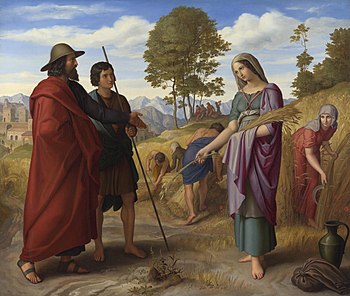The Gospels of Matthew and Luke Supply Information About the Ancestors of Jesus of Nazareth. One striking dissimilarity between the genealogies of Jesus, recorded in the Gospel accounts of Luke and Matthew, is the mention of five women in the Gospel according to Matthew.
The alleged differences in the genealogy of Jesus in the gospels of Matthew versus Luke are often disputed. But no one denies that Matthew mentions the names of five women.
The accounts of Matthew and Luke are the only two of the four Gospels that include a genealogy of Jesus. The majority of Bible scholars agree that Matthew was a Jew who wrote primarily for a Jewish audience; and that Luke was a Gentile who wrote for a Gentile (i.e. non-Jewish) readership. The New Testament scriptures do not reveal much biographical data about Luke, and it is not clearly stated whether he was a Gentile or Jew. The genealogy recorded in Luke traces the lineage of Jesus through Joseph, his earthly father, backtracking from Joseph to Adam, the first man. Whereas Matthew traces the lineage of Jesus, beginning with Abraham, the patriarch or father of the Jewish nation, moving forward in history to Joseph.
Over the years, there has been much dispute about the alleged differences between the genealogies and over how to reconcile or rather, harmonize these two Gospels. This article does not address these disagreements because it was written with another purpose in mind. That purpose being: to call attention to the fact that there is one striking dissimilarity that no scholar tries to reconcile or explain away. The Gospel according to Matthew includes the mention of five women.
-
Tamar, a dutiful widow who played the harlot
-
Rahab, a woman who was a harlot
-
Ruth, a dutiful widow who was destitute
-
Bathsheba, the wife of a murdered husband
-
Mary, a young girl who married a man named Joseph
(Note: Bathsheba is not mentioned by name. She is referred to indirectly as, her that had been the wife of Uriah. The other four women are named. )
Tamar disguised herself as a prostitute, at peril to her life, in an effort to shame her father-in-law into admitting publicly that he had wronged her and that he would honor his word and obey the law.
Rahab was a prostitute. It was not uncommon for men to frequent her residence. Yet, when certain men were seen entering her place of business, she risked her life to save theirs, not really knowing if they would, in turn, spare her life.
Bathsheba, the wife of a valiant warrior, at home alone, summoned to a king's bed-chamber to satisfy his unlawful lusts and desires. Wasn't it enough that she had been violated and that she was with child because of it? Did her husband have to be murdered to cover up the act? But it was likely reported to her that her husband, Uriah, had been killed in battle. After all, he was a soldier. Nathan, the prophet, later compared Bathsheba to a little ewe lamb, the only precious possession of a poor man and that poor man had been robbed of everything he had! But who would commit such an act of cruelty?
Ruth was a destitute widow with an uncertain future. Yet she chose to make a dangerous journey with her mother-in-law and travel to a land away from the home she had known all her life, with nothing. Would the remaining days of her life be bitter? Or would the people she had chosen to accept be willing to accept her and show her mercy and kindness?
Mary, an innocent young girl, greeted by an angel with these words: Hail Mary, full of grace, the Lord is with thee. What must she have thought? But my cousin Elisabeth is the wife of a priest and prophet. She and her husband have always been righteous before God, walking in all of His commandments and ordinances. (Luke 1:6) Who am I? What great thing have I done? Why is the Lord with me? Me?
 These brief summaries provide a glimpse into the lives of these five women. Using the various scriptural references below, one can piece together their real-life stories.
These brief summaries provide a glimpse into the lives of these five women. Using the various scriptural references below, one can piece together their real-life stories.
- TAMAR - GEN 38: 6, 24; RUTH 4: 12; 1 CHRON 2: 4; MATT 1: 3
- RAHAB - JOSH 2: 1; 6:17, 25; MATT 1: 5; HEB 11: 31; JMS 2: 25
- RUTH - RUTH 1: 1 4: 22; MATT 1: 5
- BATHSHEBA - 2 SAM 11: 3; 12: 24; 1 KINGS 1:15, 28, 31; 2:13
- MARY - MATT 1: 16, 18, 20; 2: 11; 13: 55; MK 6: 3; LK 1: 27, 30, 41, 56; 2: 5, 16, 19
While it is true that some parts of the biblical accounts are quite scandalous, the biographies of these women can also serve as inspiring accounts of hope, courage, faith, loyalty, love, obedience, and a woman's internal beauty and quiet inner strength.
Glitter rose found at glitter-graphics.com
Sources:
Similar or Related Article:
 © Photographer: Christos Georghiou | Agency: Dreamstime.com
© Photographer: Christos Georghiou | Agency: Dreamstime.com
Similar content also appears at
Blogjob.com










